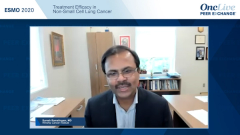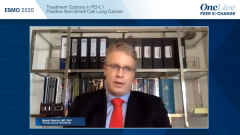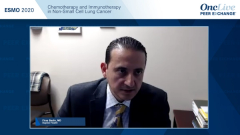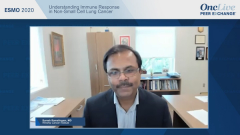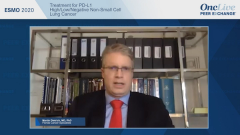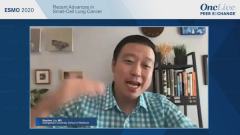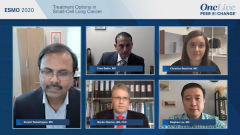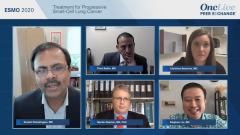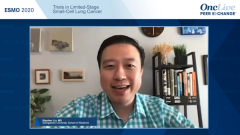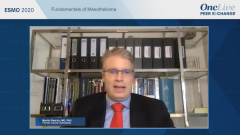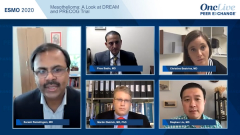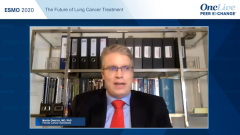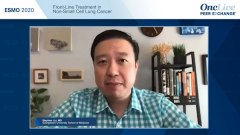
The Future of Lung Cancer Treatment
Episodes in this series

Suresh Ramalingam, MD: It’s been great updating our viewers on the new options or emerging options for mesothelioma. As we wrap up this program, I wanted to give our panel a chance to have their parting thoughts. Maybe we can ask them what they’re most excited about looking to the future, about non–small cell lung cancer and I/O [immuno-oncology] therapy.
Firas Badin, MD: I’m excited about the combination treatments and to see some research going on for patients who failed first-line PD-1 or PD-L1 inhibitors. I would like to see some more biomarker studies. I’d like to see some data that once you reuse a single agent vs dual immune checkpoint inhibitors, once you redo the combination of chemotherapy plus immunotherapy, immunotherapy plus anti-VEGF treatment. It means very little to my patients. I tell them the future looks bright. They really care about what’s available today in our clinic, and we have a lot of options for them. Despite all this excitement about the future research, I’m very happy where we stand today for our patients.
Martin Dietrich, MD, PhD: I second that. There are a lot of positive developments. I’m most excited because some of what has already been coming through at this ESMO [European Society for Medical Oncology Congress] meeting is the combination of targeted inhibitors in the right setting with the addition of immunotherapies. We’ll have to get used to the fact that certain kinds of cancers are driven by oncogenes and change our paradigm, that they may be still immunotherapy responsive, KRAS and BRAF probably being the prototypes. There have been some data in other disease spaces, where there seems to be a feasible option, even in the combination setting. We’re always concerned about TKIs [tyrosine kinase inhibitors] plus immunotherapy, but this may just be the wrong disease background, maybe even the wrong TKI where we’ve observed these findings. This is going to be very exciting.
The other part is if I look into the future and look at the new developments, people have to get used to the fact that there’s not going to be a unifying epitope, and that combinations, doublets, or even triplets will become a very reasonable alternative. It’s going to be important for us to build up multidisciplinary support systems for immunotherapy agents, where we can manage these adverse effects comprehensively early on with a lot of skill and expertise, and we can extend that benefit of multiagent immunotherapy to as large a patient population as possible.
Christine Bestvina, MD: Of all the studies we talked about today, PIONeeR is the 1 I’m most excited about. This trial is going to give us a significant number of patient tissue samples for us to ask all the important biomarker questions and to hopefully gain some insight into which patients are going to be responders, who is going to develop resistance, and what is the mechanism of that resistance, so we can potentially tackle it further down the line.
Stephen Liu, MD: The most important studies are some of the data that you presented on CheckMate 227, that Julie Brahmer presented on KEYNOTE-024, that long-term follow-up, because we are seeing that these improvements in survival are leading to impressive long-term landmark survival rates and, I would say, curing a significant portion of our patients. As we look to the future, delivering that to surgical patients where outcomes really are quite poor, and the neoadjuvant setting is going to bring that benefit even more pronounced.
Suresh Ramalingam, MD: Thank you. And for my part, I would echo some of the comments that have been made. What I’m most excited about is that we’re beginning to learn more about individual patient characteristics that provide responses to immune checkpoint inhibition. We’ve barely scratched the surface, but that knowledge is increasing, and that information is going to help us personalize immunotherapy for patients the way we’ve personalized targeted therapy for a subset of non–small cell lung cancers.
It’s been a great discussion. I’ve enjoyed learning from all of you today. I hope our audience finds this program informative and helpful to their patient care. I want to thank Dr Badin, Dr Dietrich, Dr Bestvina, and Dr Liu for participating in this panel. Thank you again to our audience for joining us. We hope you found this OncLive® Peer Exchange® discussion useful and informative. Thank you.
Transcript Edited for Clarity


